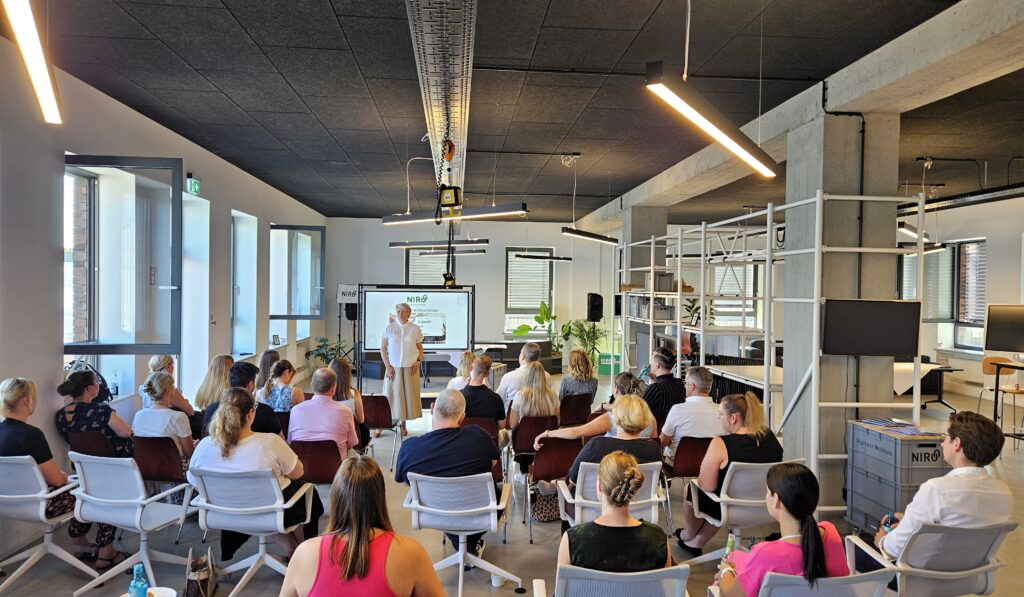When flyers for academy events become subjects: Then it was the hottest day of the year so far, when around 30 HR and training managers met for HR Day in our harbor room to think about the future of HR.
On July 2, 2025, we premiered a new format in our network that brings together everyone who works primarily in HR and training in our member companies on an overarching topic.
The first NIRO HR Day on the topic of the future of HR had it all: the midsummer temperatures were mastered with aplomb and the multifaceted content impulses – keynote speeches and flashes of inspiration – brought new, motivating and refreshing ideas to the group.
NIRO Managing Director Ingrid Lange welcomed the guests and initiated a short round of introductions.
The keynote speech by Prof. Dr. Christoph Schönfelder then went straight into the question of how HR can act as a catalyst for positive change.
Keynote: HR under pressure to change – navigating between technology and humanity
Prof. Dr. Christoph Schönfelder, Professor of Human Resources and Organizational Development and co-founder of the AI-supported leadership tool MONDAY.ROCKS, got to the heart of what many of us know right from the start: The dynamics and complexity that we experience in our everyday lives and at work have increased dramatically. Many topics, many tasks, many decisions, new and old uncertainties, constant effort, lack of motivation. HR must constantly change and adapt to meet new challenges. There are not always clear rules for orientation, improvisation and knowledge of human nature are required and it is best to act like a player on the soccer pitch who reflexively decides which foot to aim at the goal when turning around.
Then there is also the demographic development. Not all companies can use AI agents right now. Skills and labor shortages are slowing things down, and existing potential cannot always be fully exploited. Teams don’t always run smoothly, generational and cultural conflicts are exhausting, diversity is challenging. What about preserving and passing on (experience) knowledge within the company?
Next: the triumph of AI. AI applications are suitable for everyday use, robotics is merging with AI, computing speed is increasing immensely and quantum computers are being developed. There is no alternative to AI.
Complex challenges, demographic changes, the rise of artificial intelligence: how can we create a symbiosis between technological advances and a human-centered approach? What can we do concretely in our organizations, where the desire for change does not always reign and restraint is more the order of the day than enthusiasm?
Prof. Dr. Christoph Schönfelder shares his recommendations at the end: Set clear priorities. Not everything is equally important. You can sometimes leave something out or forget it or put it at the back. Analyze interfaces, qualitatively and quantitatively. Analyze teams, rethink, improve and vary their structure and set-up.
Bring a little more lightness back into everyday working life: Integrate elements of gamification, find playful approaches to processes, strengthen the mood, morale and culture.
And last but not least: Get started. Take small steps to tackle big issues. With AI tools in particular, you can try out a lot and make things easier on many levels.
6 flashes of inspiration for the future of HR
After the keynote speech, which took a look at the current mood, it was time for the small, subtle flashes of inspiration. Short impulses from experts shed light on individual focal points.
In the first thought-provoking session, Joachim Ulbert from Adecco Personaldienstleistungen GmbH shared his thoughts on the future of work and what relevant changes can be observed so far with the group.
Sonja Müller from the RKW Competence Center directed our attention to the skills and competencies we will need in the future under the title “Future Skills”.
Alexandra Edelhoff, Diagramm Halbach GmbH & Co. KG, spoke from one of our member companies about how finding, retaining and developing employees plays a key role in the corporate culture at her company.
Ciaron Gregor Wolters from Personalwerk GmbH highlighted the opportunities and potential that diversity offers as a success factor.
Oliver Hecker, Tempton Personaldienstleistungen GmbH, addressed the future of recruiting in his thought-provoking talk.
Dr. Elvira Radaca from the Chair of Work, Organizational and Business Psychology at the University of Wuppertal took our group on a journey into the health revolution of 2040 and presented us with a scenario that makes healthy working a matter of course.
Future Café with themed tables
In the workshop part of our HR Day, there were a total of five themed tables where lively discussions took place in small groups. The topics included the skills of the future, finding – retaining – developing employees in the future, how health can serve as a lever for culture, performance and employer attractiveness, which fields of action HR can focus on in terms of corporate culture and the all-important question of whether the future of HR will lead to paradise or purgatory.
After a short round of results, there was a small snack to round off the day.
Conclusion: A truly hot first HR day is over. High temperatures, a hot topic, formulation of real and shared challenges, tips and recommendations, new ideas and inspiration and a welcome exchange of experiences.
Many thanks to all those who supported us thematically, with a keynote and flashes of inspiration or as a moderator at one of the themed tables!
And yes: there will certainly be a sequel at the beginning of 2026.
For all those who would like to take another look at the most important aspects: In our NIRO app, you can find the photo protocol for our first staff day under the documents in the People section. The presentations of the individual contributions are also stored there.
